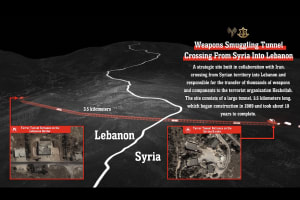Netanyahu responds to European weapon suppliers' alleged silent boycott: 'If we have to stand alone, we will stand alone'

European weapons suppliers are increasingly implementing a silent boycott of simple munition sales to Israel, according to the news outlet Calcalist.
As the ongoing conflict between Israel and Iranian terrorist proxies Hamas and Hezbollah passes the nine-month mark, Israel Defense Forces has sought to replenish its depleting munitions reserve through international sources.
While the media has mainly focused on delayed U.S. arms shipment to Israel, several European suppliers have reportedly stopped responding to requests from their Israeli counterparts amid the war. In addition, Additionally, an unnamed country that traded with Israel before Oct. 7 has reportedly refused to supply Israel with the crucial raw materials that is needed for ammunition production.
The New York Times recently reported that Israel Defense Forces faces a “munitions economy” due to a growing shortage of various munitions including 120 mm shells for tanks that have been used extensively during the war. In addition, the IDF is reportedly facing a growing shortage of spare parts for tanks and other military vehicles. The depletion of munitions depots and a potentially more intense war with Hezbollah has reportedly pushed some Israeli generals to be willing to accept a ceasefire in Gaza even if it means that Hamas leadership stays in power.
Former Israeli National Security Advisor Eyal Haluta believes that a truce in Gaza would enable the Israeli military to rearm and better prepare for a future potential full-scale war with Hezbollah, which has a more powerful military force than Hamas.
“They understand that a pause in Gaza makes de-escalation more likely in Lebanon. And they have less munitions, less spare parts, less energy than they did before — so they also think a pause in Gaza gives us more time to prepare in case a bigger war does break out with Hezbollah,” Haluta assessed.
In February, a Dutch court ordered its government to stop providing F-35 components to the Israeli Air Force (IAF) or risk “serious violations of international humanitarian law.”
“The court orders the State to cease all actual export and transit of F-35 parts with final destination Israel within seven days after service of this judgement,” the court stated.
Due to limited local natural resources, the Israeli military needs to import raw materials needed for the production of bombs and other vital equipment.
Calcalist reported that several suppliers have stopped selling crucial raw materials to Israel since Oct. 7. Israel has countered this challenge by diversifying its suppliers and gradually establishing a large reserve of raw materials at home.
The Israeli defense establishment has reportedly addressed the munitions shortage by calling for an expansion of the local Israeli military industry’s production capabilities. The purpose of such a strategy is to reduce Israel’s reliance on international military suppliers in areas considered vital for its security. While this would enhance the local military industry, it would also increase the cost of munitions due to the relatively higher production costs in Israel.
Some pundits argue that, because of Israel’s limited size, it is unrealistic for the country to achieve full independence from international suppliers. The United States, with its vast industrial capabilities, has even reportedly struggled to maintain supplies to its allies during Russia's ongoing war in Ukraine.
We recommend to read:

The All Israel News Staff is a team of journalists in Israel.














